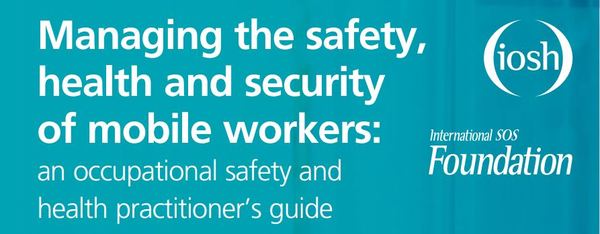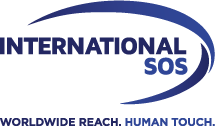New Occupational Safety and Health Guide
London
New guide to managing mobile workers’ safety, health and security launched
Includes:
- Risk analysis by traveller gender, age, sexuality and disability
- Case studies, action plans, legal considerations and information for individual travellers

Managing the safety, health and security of mobile workers: an occupational safety and health practitioner's guide outlines the aspects of safety, health and security for which organisations should take responsibility when they have workers travelling for work or on international assignments.
The publication, developed jointly by the International SOS Foundation and the Institution of Occupational Safety and Health (IOSH), addresses the need for careful planning and preparation in considering worker wellbeing and medical, personal safety and security issues.
Kate Field, IOSH’s head of information and intelligence, said: “Many organisations send people to work abroad, either on short-term visits or on longer-term assignments. The duty of care they owe to their workers continues to exist when they are working abroad, whatever the reason for their travel and deployment.
“It is because of this that the role of the occupational safety and health professional is identified as key in helping to manage events that could have an impact on the safety, health and security of workers travelling or working abroad. It is the OSH professional who has the competencies to assess risk and then subsequently plan, maintain and implement risk mitigation strategies, systems and procedures.”
After outlining the principles of assessing risk, the new publication makes the case for dynamic risk assessment, in which risk is constantly re-assessed in line with changing health, security and political conditions.
It underlines the need for safety while travelling on roads, in the choice of accommodation and in managing the risks from non-communicable and communicable diseases.
In recognition of the diversity of people who travel for work abroad, the publication also looks at arrangements that may be required for women, older workers, workers with disabilities, workers who are lesbian, gay, bisexual or transgender, and students on placement.
In addition, the guide considers how to respond should a critical situation develop, and highlights the need for an emergency action plan to have been established prior to any incident.
The guide was officially launched today (Tuesday 21 June) at the Safety and Health Expo, in London, following a presentation by Dr David Gold, senior consultant to the International SOS Foundation.
Dr Gold, who is also a chartered member of IOSH, said: “The number of people travelling for work, whether domestically or internationally is ever-increasing and there are significant risks that they can face.
“The ability of the employer to be able to identify and assess the risk, and understand the measures that they need to put in place to protect their travelling workforce, can often be improved. Safety and health practitioners, meanwhile, have the knowledge, skills and experience to do the risk assessment and manage emergencies but are not necessarily adapting those skills towards people who are travelling for work.
“This guide aims to highlight the role of the safety and health professional in the process of building company resilience. It also provides for building competencies allowing safety and health professionals, as part of teams managing travel, to work more effectively with assistance centres.”
The International SOS Foundation is an independent, not-for-profit organisation with a goal to improve the health, safety, security and wellbeing of people working away from home, internationally and on assignment.
In his foreword published in the guide, Dr Pascal Rey-Herme, group medical director at International SOS, said: “The world is changing. Many people no longer work in their home country. Organisations around the globe are expanding and sending their people to work in emerging markets and high-risk locations.”
He added: “The health, safety and wellbeing of international assignees and business travellers fall under the responsibility of the employer. There is a need to have clear organisational policies and strategies in place as well as competent individuals to manage the travel safety, health and security for all travellers.”
The new guide will be featured throughout the Safety and Health Expo, which is taking place at London ExCeL from 21-23 June. IOSH is also holding its annual conference at the venue on 21-22 June.
The guide will be presented in detail during the workshop, “The Mobile World of Work,” at 2:55 pm, 22 June (Track B). The workshop is hosted by Dr Mark Parrish, Regional Medical Director of International SOS, Dr Gold, and Tim Willis, Regional Security Director, International SOS and Control Risks.
A free online version of the new guide is available to download at www.iosh.co.uk/mobileworkers.
IOSH
IOSH is the Chartered body for health and safety professionals. With more than 44,000 members in 120 countries, we’re the world’s biggest professional health and safety organisation.
We set standards, and support, develop and connect our members with resources, guidance, events and training. We’re the voice of the profession, and campaign on issues that affect millions of working people. IOSH was founded in 1945 and is a registered charity with international NGO status.
About International SOS Foundation
Established in 2011, the International SOS Foundation ― Ambassadors for Duty of Care www.internationalsosfoundation.org – has the goal of improving the safety, security, health and welfare of people working abroad or on remote assignments through the study, understanding and mitigation of potential risks. The escalation of globalisation has enabled more individuals to work across borders and in unfamiliar environments; exposure to risks which can impact personal health, security and safety increases along with travel.
The Foundation is a registered charity and was started with a grant from International SOS. It is a fully independent, non-profit organisation.
For more information on Duty of Care and the International SOS Foundation, please visit http://www.internationalsosfoundation.org/








